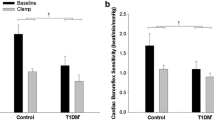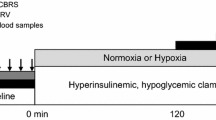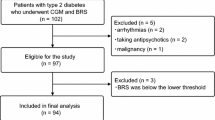Abstract
Purpose
Hypoglycemia is associated with increased mortality, though the mechanisms underlying this association are not established. Hypoglycemia impairs the counterregulatory hormonal and autonomic responses to subsequent hypoglycemia. It is unknown whether hypoglycemia elicits a generalized impairment in autonomic control of cardiovascular function in individuals with type 2 diabetes. We tested the hypothesis that in individuals with type 2 diabetes, hypoglycemia impairs a key measure of cardiovascular autonomic homeostasis, baroreflex sensitivity.
Methods
Sixteen individuals with well-controlled type 2 diabetes and without known cardiovascular disease were exposed to two 90-min episodes of experimental hypoglycemia (2.8 mmol/L, 50 mg/dL) on the same day. All individuals experienced a hypoglycemic-hyperinsulinemic clamp in the morning (AM clamp) and again in the afternoon (PM clamp). Baroreflex sensitivity was assessed using the modified Oxford method before the initiation of each hypoglycemic-hyperinsulinemic clamp, during the last 30 min of hypoglycemia, and the following morning. A mixed effects model adjusting for sex, age, BMI, and insulin level, demonstrated a significant effect of hypoglycemia on baroreflex sensitivity. The study is registered at ClinicalTrials.gov (NCT03422471).
Results
Baroreflex sensitivity during PM hypoglycemia was reduced compared to baseline, during AM hypoglycemia, and the next day. Insulin levels positively correlated with baroreflex sensitivity at baseline and during AM hypoglycemia.
Conclusion
Exposure to hypoglycemia impairs a key measure of autonomic control of cardiovascular function and, thus, may increase the risk of cardiac arrhythmias and blood pressure lability in individuals with type 2 diabetes. This effect is attenuated in part by increased insulin levels.






Similar content being viewed by others
Availability of data and material
The datasets used and/or analyzed during the current study are available from the corresponding author on reasonable request.
References
Epidemiology of severe hypoglycemia in the diabetes control and complications trial. The DCCT Research Group. Am J Med 1991; 90(4): 450–9.
Nathan DM, Diabetes C, Complications Trial Research G et al (1993) The effect of intensive treatment of diabetes on the development and progression of long-term complications in insulin-dependent diabetes mellitus. N Engl J Med 329(14):977–986
Group UKHS (2007) Risk of hypoglycaemia in types 1 and 2 diabetes: effects of treatment modalities and their duration. Diabetologia 50(6):1140–1147
Gerstein HC, Miller ME, Action to Control Cardiovascular Risk in Diabetes Study G et al (2008) Effects of intensive glucose lowering in type 2 diabetes. N Engl J Med 358(24):2545–2559
Seaquist ER, Miller ME, Bonds DE et al (2012) The impact of frequent and unrecognized hypoglycemia on mortality in the ACCORD study. Diabetes Care 35(2):409–414
Segel SA, Paramore DS, Cryer PE (2002) Hypoglycemia-associated autonomic failure in advanced type 2 diabetes. Diabetes 51(3):724–733
Dagogo-Jack SE, Craft S, Cryer PE (1993) Hypoglycemia-associated autonomic failure in insulin-dependent diabetes mellitus. Recent antecedent hypoglycemia reduces autonomic responses to, symptoms of, and defense against subsequent hypoglycemia. J Clin Invest 91(3):819–828
Lin YK, Fisher SJ, Pop-Busui R (2020) Hypoglycemia unawareness and autonomic dysfunction in diabetes: lessons learned and roles of diabetes technologies. J Diabetes Investig 11(6):1388–1402
Guyenet PG (2006) The sympathetic control of blood pressure. Nat Rev Neurosci 7(5):335–346
Kaufmann H, Norcliffe-Kaufmann L, Palma JA (2020) Baroreflex dysfunction. N Engl J Med 382(2):163–178
Vinik AI, Ziegler D (2007) Diabetic cardiovascular autonomic neuropathy. Circulation 115(3):387–397
Spallone V, Ziegler D, Freeman R et al (2011) Cardiovascular autonomic neuropathy in diabetes: clinical impact, assessment, diagnosis, and management. Diabetes Metab Res Rev 27(7):639–653
Mustafa HI, Fessel JP, Barwise J et al (2012) Dysautonomia: perioperative implications. Anesthesiology 116(1):205–215
Rao AD, Bonyhay I, Dankwa J et al (2016) Baroreflex sensitivity impairment during hypoglycemia: implications for cardiovascular control. Diabetes 65(1):209–215
Adler GK, Bonyhay I, Failing H, Waring E, Dotson S, Freeman R (2009) Antecedent hypoglycemia impairs autonomic cardiovascular function: implications for rigorous glycemic control. Diabetes 58(2):360–366
Pricher MP, Freeman KL, Brooks VL (2008) Insulin in the brain increases gain of baroreflex control of heart rate and lumbar sympathetic nerve activity. Hypertension 51(2):514–520
Young CN, Deo SH, Chaudhary K, Thyfault JP, Fadel PJ (2010) Insulin enhances the gain of arterial baroreflex control of muscle sympathetic nerve activity in humans. J Physiol 588(Pt 18):3593–3603
Lipman RD, Salisbury JK, Taylor JA (2003) Spontaneous indices are inconsistent with arterial baroreflex gain. Hypertension 42(4):481–487
Group AC, Patel A, MacMahon S et al (2008) Intensive blood glucose control and vascular outcomes in patients with type 2 diabetes. N Engl J Med 358(24):2560–2572
Duckworth W, Abraira C, Moritz T et al (2009) Glucose control and vascular complications in veterans with type 2 diabetes. N Engl J Med 360(2):129–139
Bedenis R, Price AH, Robertson CM et al (2014) Association between severe hypoglycemia, adverse macrovascular events, and inflammation in the Edinburgh Type 2 Diabetes Study. Diabetes Care 37(12):3301–3308
Finfer S, Chittock DR, Investigators N-SS et al (2009) Intensive versus conventional glucose control in critically ill patients. N Engl J Med 360(13):1283–1297
Van den Berghe G, Wilmer A, Hermans G et al (2006) Intensive insulin therapy in the medical ICU. N Engl J Med 354(5):449–461
La Rovere MT, Pinna GD, Hohnloser SH et al (2001) Baroreflex sensitivity and heart rate variability in the identification of patients at risk for life-threatening arrhythmias: implications for clinical trials. Circulation 103(16):2072–2077
La Rovere MT, Bigger JT Jr, Marcus FI, Mortara A, Schwartz PJ (1998) Baroreflex sensitivity and heart-rate variability in prediction of total cardiac mortality after myocardial infarction. ATRAMI (Autonomic Tone and Reflexes After Myocardial Infarction) Investigators. Lancet 351(9101):478–484
De Ferrari GM, Sanzo A, Bertoletti A, Specchia G, Vanoli E, Schwartz PJ (2007) Baroreflex sensitivity predicts long-term cardiovascular mortality after myocardial infarction even in patients with preserved left ventricular function. J Am Coll Cardiol 50(24):2285–2290
Freeman R (2014) Diabetic autonomic neuropathy. Handb Clin Neurol 126:63–79
Leung JH, Bayomy OF, Bonyhay I et al (2020) ACTH infusion impairs baroreflex sensitivity-implications for cardiovascular hypoglycemia-associated autonomic failure. J Clin Endocrinol Metab 105(7):2345–2353
Funding
Bausch Health provided the nitroprusside for this study. This work was conducted with support from Harvard Catalyst | The Harvard Clinical and Translational Science Center (NCRR and NCATS, NIH Award UL1 TR001102), and the following grants from the NIH: K23HL155076 (AVH), K24HL103845 (GKA), R01HL111465-02 (RF), R01HL109634-02 (RF).
Author information
Authors and Affiliations
Corresponding author
Ethics declarations
Conflict of interest
All authors have no financial or non-financial interests that are directly or indirectly related to the work.
Ethical approval
The institutional review boards at Brigham and Women’s Hospital and Beth Israel Deaconess Medical Center approved all study procedures, and all subjects gave written informed consent.
Rights and permissions
Springer Nature or its licensor (e.g. a society or other partner) holds exclusive rights to this article under a publishing agreement with the author(s) or other rightsholder(s); author self-archiving of the accepted manuscript version of this article is solely governed by the terms of such publishing agreement and applicable law.
About this article
Cite this article
Haas, A.V., Koefoed, A., Easly, R.M. et al. Effect of hypoglycemia on baroreflex sensitivity in individuals with type 2 diabetes: implications for autonomic control of cardiovascular function in diabetes. Clin Auton Res 33, 727–735 (2023). https://doi.org/10.1007/s10286-023-00983-5
Received:
Accepted:
Published:
Issue Date:
DOI: https://doi.org/10.1007/s10286-023-00983-5




